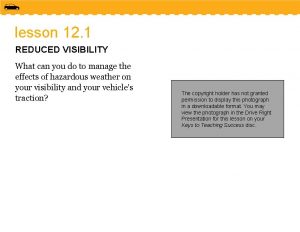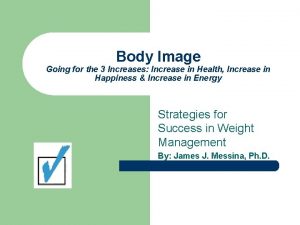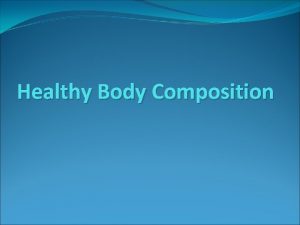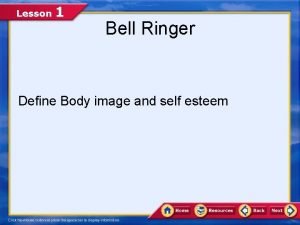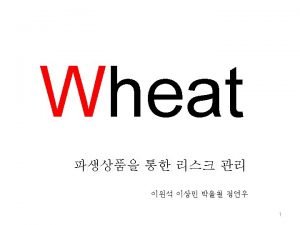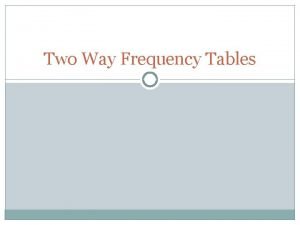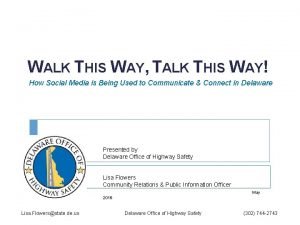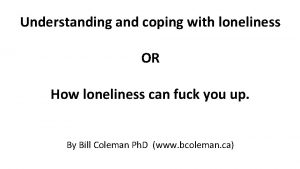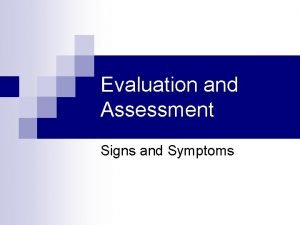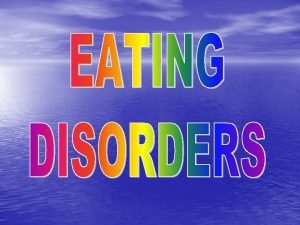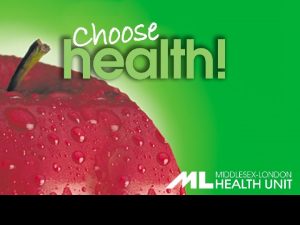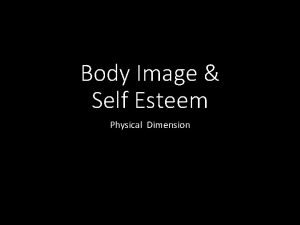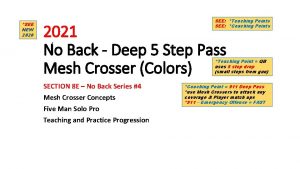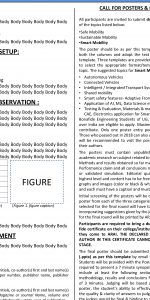Body Image The way you see your body



Body Image “The way you see your body”

Weight-Calorie Connection Maintaining a healthy weight is a matter of energy balance: Calories In = Calories Out

Weight-Calorie Connection To Gain Weight More Calories In vs. Less Calories Out To Lose Weight Less Calories In vs. More Calories Out

Energy Equation 1 pound of body fat = 3, 500 calories. Eating 500 fewer calories per day will result in the loss of 1 pound of fat per week (500 cals. x 7 days = 3, 500 calories)

Appropriate Weight Range Gender Age Body Frame Metabolic Rate Height Growth Rate Activity Level

Body Mass Index (BMI) A ratio that allows you to assess your body size in relation to your height and weight.

Body Mass Index (BMI) Weight (lbs. ) x 703 2 (Height in inches)

Body Mass Index (BMI) Ex. Man 185 lbs. 5’ 7” tall BMI = 185 x 703 / 67 x 67 BMI = 130, 055 / 4, 489 BMI = 29. 0


Body Composition “The ratio of body fat to lean body tissue”

Name Height Weight BMI Tom Brady Kobe Bryant 6’ 4 6’ 6 225 lbs 200 lbs 27 25 George Clooney 5’ 11 211 lbs 29 Tom Cruise 5’ 7 201 lbs 31 Denzel Washington 6’ 0 199 lbs 27 Will Smith Keanu Reeves Brad Pitt Lebron James Johnny Depp 6’ 2 6’ 1 6’ 0 6’ 8 5’ 7 210 lbs 223 lbs 203 lbs 240 lbs 190 lbs 27 29 28 26 27 The Rock (Dwayne Johnson) 6’ 5 275 lbs 33

Overweight “A condition in which a person is heavier than the standard weight range for his or height” 10 -20% higher than normal weight 150 lb person weighs 165 lb or more

Obesity “Having an excess amount of body fat” Obese: 20% or more above normal 150 lb person weighs 180 lb

Morbidly Obese 50% or more above normal weight 150 lb person weighs 225 lbs. 2/3 or 120 million adult Americans are either overweight or obese article

Weight related health risks ü Cardiovascular disease ü High blood pressure ü Type 2 diabetes ü Osteoarthritis ü Asthma ü Cancer U. S. children grow bigger bellies | Health | Reuters

Overweight related facts • 1 out of 5 teens are overweight. • Being overweight forces the heart and lungs to work harder and increases the risk of high blood pressure and high blood cholesterol.

Overweight related facts • Genetics may play a role in being overweight. • Obesity and overweight usually results from consuming excess calories and physical inactivity. article

Underweight “A condition in which a person is 10% or less than the standard weight range for his or height” 150 lb person weighs 135 lb or less

Underweight related facts • Underweight people have little stored fat to provide the body with an energy reserve. • Not consuming enough calories and nutrients for health and growth may lead to fatigue and a decreased ability to fight illness.

Managing Your Weight ü Target your appropriate weight ü Set realistic goals ü Personalize your plan ü Put your goal and plan in writing ü Evaluate your progress

Basal Metabolic Rate (BMR) Women 655 + (4. 35 x wt) + (4. 7 x ht. inches) – (4. 7 x age) Men 66 + (6. 23 x wt) + (12. 7 x ht. inches) – (6. 8 x age)

Basal Metabolic Rate (BMR) Sedentary (No Activity)= x 1. 2 Lightly Active (Weekends) = x 1. 375 Moderate Active (3 x’s / wk) = x 1. 55 Very Active (5 x’s / wk) = 1. 725 Extremely Active (Every Day Sports) = x 1. 9

Weight Loss Strategies ü Eat about 250 calories less than your daily energy requirements ü Include your favorites in small quantities ü Eat a variety of low-calorie, nutrient dense food (grains, fruit) ü Drink plenty of water

Weight Gain Strategies ü Increase your calorie intake ü Eat often and take seconds ü Eat nutritious snacks ü Build muscle by performing weight bearing exercises

Physical Activity ü Relieves stress that leads to over or under eating ü Promotes a normal appetite response ü Increases self-esteem and helps keep your plan on track ü Muscle burns more calories than fat at rest


Fad Diets “Weight-loss plans that are popular for only a short time”

Examples of Fad Diets Liquid diets Fasting Diet pills

Liquid Diets Replacing all of your food intake with a special liquid formula. Does not provide the body with fiber and needed nutrients.

Fasting • Abstaining from eating. • Body breaks down protein stored in muscle tissue for energy.

Diet Pills Diet pills suppress your appetite. Cause drowsiness, anxiety, racing heart; can be addictive; causes dehydration

Weight Cycling “The repeated pattern of weight loss and regain” Weight cycling is common in people who follow fad diets

Eating Disorder “An extreme, harmful eating behavior that can cause serious illness or death”

Eating Disorder Statistics Women account for 90% of all eating disorders

Examples of Eating Disorders Anorexia Nervosa Bulimia Nervosa Binge Eating Disorder

Anorexia Nervosa “A disorder in which the irrational fear of becoming obese results in severe weight loss from self-imposed starvation”

Anorexia Nervosa Consequences • • • Malnutrition and starvation Low body temperature Low blood pressure Reduced organ size, Irregular heart beat, Cardiac arrest or sudden death.

Bulimia Nervosa “A disorder in which some form of purging of the digestive tract follows cycles of overeating”

Bulimia Nervosa Consequences • Vomiting causes dehydration • Kidney damage, • Irregular heartbeat, • Tooth decay, • Damages tissue of the stomach, esophagus, and mouth

Binge Eating Disorder “A disorder characterized by compulsive overeating”

Binge Eating Disorder Consequences • • Unhealthful weight gain Type 2 diabetes, Heart disease Strokes and high blood pressure

Help for Eating disorders • People with ED need medical and psychological help. • If you think you or a friend has an ED, discuss it with a parent, counselor, or school nurse. • Seek professional help and be supportive.

Homework for Tomorrow • Sign up to Review 1 Dietary Supplement • What is the purpose for taking the supplement? Does it work? • What is the recommended dosage?


Performance Nutrition Do you play on a sports team or take aerobic classes? Good nutrition can help you perform your best in any physical activity.

The Training Diet The best eating plan for athletes is one that is balanced, moderate, and varied. Your body needs protein, carbohydrates, vitamins, minerals and water. Athletes need more calories from nutrientdense foods to maintain weight and energy levels.

Hydration Your body loses fluids through perspiration, breathing, and waste elimination. • 16 -24 oz. of fluids before workouts • 6 -12 oz. of fluids every 15 min during workouts

Heatstroke “A condition in which the body loses the ability to rid itself of excessive heat through perspiration”

Electrolytes “Minerals that help maintain the body’s fluid balance”

Rehydration “Restoring lost body fluids”

Losing Weight (competition) ü Fasting or crash dieting ü Sweating before weigh-in ü Causes dehydration and harms performance ü Loss of muscle mass ü Use sensible plan ü Lose 1 -2 pounds per week

Gaining Weight (competition) ü Balanced nutrition & exercise plan ü Resistance training program ü Extra calories from nutrient-dense foods ü Use protein supplements sparingly üGain 1 -2 pounds per week ü Steroids have dangerous side effects

Eating Before Competition ü Eat 3 -4 hours before competition ü Choose a meal low in protein and fat and high in carbohydrates ü Pasta, rice, vegetables, fruit ü Drink plenty of water

Vegetarian “A person who eats mostly or only plant foods which may include eggs or dairy products”

Vegan “Vegetarians who eat only plant based foods”

Meeting Vegan Nutrient Needs • Eat a variety of incomplete proteins that will add up to complete proteins. • Make sure you get enough iron, zinc, and B vitamins. • Eat nutrient-dense foods like fruits, vegetables, leafy greens, grains, nuts, seeds, legumes, dairy and eggs.

Dietary Supplement “A non-food form of one or more nutrients” Do not assume you need a dietary supplement, ask a health care provider

Megadose “A very large amount of a dietary supplement”

Herbal supplement “A chemical substance from plants that may be sold as a dietary supplement”

Are Herbal Supplements Safe Because They Are Natural? • Natural does not mean harmless. • Certain herbs are poisonous, others interact dangerously with prescription or overthe-counter drugs.

Quiz Review • Examples of nutrient dense foods? • What is Body Composition? • How many calories in one pound of body fat? • Definition of Obese, Morbidly Obese.
- Slides: 63




